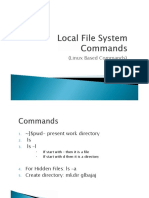0% found this document useful (0 votes)
21 views18 pagesDSP Lab Manual
The document provides various Python implementations of data structures and algorithms, including lists, tuples, sets, dictionaries, stacks, queues, linked lists, and sorting algorithms. It also includes examples of recursive functions such as factorial and the Towers of Hanoi problem. Each implementation is accompanied by example usage and outputs to demonstrate functionality.
Uploaded by
techcoder369Copyright
© © All Rights Reserved
We take content rights seriously. If you suspect this is your content, claim it here.
Available Formats
Download as PDF, TXT or read online on Scribd
0% found this document useful (0 votes)
21 views18 pagesDSP Lab Manual
The document provides various Python implementations of data structures and algorithms, including lists, tuples, sets, dictionaries, stacks, queues, linked lists, and sorting algorithms. It also includes examples of recursive functions such as factorial and the Towers of Hanoi problem. Each implementation is accompanied by example usage and outputs to demonstrate functionality.
Uploaded by
techcoder369Copyright
© © All Rights Reserved
We take content rights seriously. If you suspect this is your content, claim it here.
Available Formats
Download as PDF, TXT or read online on Scribd
/ 18























































































